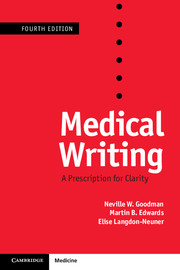Book contents
- Frontmatter
- Dedication
- Epigraph
- Contents
- Foreword
- Preface to the fourth edition
- Layout of the fourth edition
- Preface to the first edition
- Acknowledgements
- Part I Problem: the illness
- Part II Solution: symptomatic relief
- 4 Technology, changing language and authority
- 5 Guidelines to clearer writing
- 6 Spelling
- 7 Is there a better word?
- 8 Superfluous words
- 9 Imprecise words
- 10 Superfluous phrases
- 11 Trouble with short words
- 12 Use of the passive voice
- 13 Consistency: number and tenses
- 14 Word order
- 15 Punctuation
- 16 Circumlocution
- 17 Words and parts of speech for EAL writers
- 18 Clichés and article titles
- 19 Constructing sentences
- 20 Further help with sentences for EAL writers
- 21 Drawing clear graphs
- 22 It can be done
- Part III Practice: recuperation
- Appendix British–American English
- References and further reading
- Index
9 - Imprecise words
Published online by Cambridge University Press: 05 September 2014
- Frontmatter
- Dedication
- Epigraph
- Contents
- Foreword
- Preface to the fourth edition
- Layout of the fourth edition
- Preface to the first edition
- Acknowledgements
- Part I Problem: the illness
- Part II Solution: symptomatic relief
- 4 Technology, changing language and authority
- 5 Guidelines to clearer writing
- 6 Spelling
- 7 Is there a better word?
- 8 Superfluous words
- 9 Imprecise words
- 10 Superfluous phrases
- 11 Trouble with short words
- 12 Use of the passive voice
- 13 Consistency: number and tenses
- 14 Word order
- 15 Punctuation
- 16 Circumlocution
- 17 Words and parts of speech for EAL writers
- 18 Clichés and article titles
- 19 Constructing sentences
- 20 Further help with sentences for EAL writers
- 21 Drawing clear graphs
- 22 It can be done
- Part III Practice: recuperation
- Appendix British–American English
- References and further reading
- Index
Summary
The cardinal sin in medical writing is not grammatical error but obscurity.
(Stanley Gilder, Change without decay. Med J Aust 1962; I: 957–62.)Some words are used as ‘catch-alls’, when a little thought would suggest a better word. Sometimes associate, involve, concern and regard are appropriate; but often they indicate laziness. If you find the following words in your first draft, think carefully about whether they could be replaced by more precise ones. Just as we reckon novel the exemplar of the misused word (p. 47), so address and target are the exemplars of the imprecise word: address can replace just about any verb, and target can be a noun, verb or adjective.
ACHIEVE, ATTAIN
[PubMed® achieved 1.5-fold, reached 0.6-fold. Ngram achieved 0.7-fold, reached no change. Achieved:reached ratio PubMed® 3:1, Ngram 1:2.]
If achieve cannot be replaced by reach or obtain, then it might indicate that the construction of the sentence should be altered. Achieve is commonly superfluous.
Maximum pressures are said to be attained after . . .
Attain, achieve and reach can all mean to get there but reach means just that; it is a good simple word that does not colour its surroundings. A guide to the best verb can be the noun formed from it: the achievement of a lifetime’s ambition; the attainment of a great, perhaps metaphorical, height. Looked at in this way, these words are not good ones for our rather more mundane purpose. Maximum pressures are said to be attained after . . . is rather grand for a scientific report. The best verb here, though, is occur: are said to occur after . . . (even though occur is suffering from overuse (see p. 81)).
The only way in which a lower rate can be achieved . . .
- Type
- Chapter
- Information
- Medical WritingA Prescription for Clarity, pp. 183 - 199Publisher: Cambridge University PressPrint publication year: 2014



